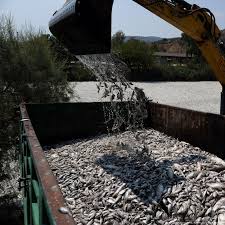Greece declares state of emergency over flood of dead fish

Athens: Greece declared a monthlong state of emergency in its central port city of Volos on Saturday after thousands of freshwater fish died, the country’s main news agency reported.
Authorities have promised extra cash and other support to deal with the mass die-off, in what is the area’s second environmental disaster in a year.
Authorities said the freshwater fish died as a result of devastating floods that hit Greece’s central Thessaly region last year.
The storms flooded more than 20,000 hectares of land and refilled the nearby Lake Karla that had been drained in 1962 in a bid to fight malaria, swelling it to three times its normal size.
The lake waters have since receded drastically, as a result of a severe drought, forcing the fish toward the Volos port that empties into the Pagasetic Gulf and the Aegean Sea.
But they cannot survive the salty sea waters and thousands of dead fish have clogged the waters around the port city, which is about a three-and-a-half-hour drive north of Athens.
The Civil Protection Emergency measure will allow local authorities to commit funding and other resources to finish the cleanup of the fish, the Athens News Agency reported.
The emergency was declared by Climate Minister Vassilis Papageorgiou and is set to last until September 30.
The operation to remove the fish has been underway for several days, with fishing trawlers chartered by the regional authorities, along with earthmovers, to scoop up the dead fish.
The fish are then loaded onto trucks and taken to an incinerator.
On Tuesday alone, authorities said they had removed 57 tons of the washed-up dead fish.
By Thursday, officials said 100 tons of the fish had been picked up.
Ertnews channel reported that two boats are due to continue the recovery operation on Saturday.
Special nets have also been placed at the mouth of the Xiria River to help contain the large volume of dead fish.
The mayor of Volos lashed out at the regional authority, accusing it of acting too slowly, telling a news conference on Wednesday that the smell from the dead fish was unbearable.
Tourism to the region has plunged by nearly 80% since last year’s flooding, according to the local association of restaurants and bars.
“The situation with this dead fish will be the death of us,” Stefanos Stefanou, the president of the association, said earlier this week. “What visitor will come to our city after this?”
Volos’ Chamber of Commerce said it was taking legal action to seek damages after the severe drop in commercial activity.
The public prosecutor has launched an investigation into the crisis.
Greece is seeing increasing incidents of extreme weather that scientists link to climate change.
They include higher temperatures and erratic rainfall that cause wildfires and flooding.





